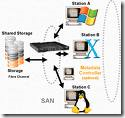 This article provides a brief history and description of Windows file systems and Mac file systems.
This article provides a brief history and description of Windows file systems and Mac file systems.
File Systems
A file system organizes large numbers of files on some sort of recording medium (most commonly a disk drive or cd-rom). Mac and PC computers use different primary file systems which is why a program like TransMac is necessary.
The two common versions of Mac file systems (or volume formats) are standard HFS and Mac OS Extended (or HFS+). HFS came about early on in the life of the Macintosh line when disks had relatively small capacities. Limitations appeared in this format when disk drives grew very large in size. Mac OS Extended (or HFS+ as it was originally called) is similar to HFS but some of its internal structures were changed to accommodate the changing needs of modern personal computing. The major differences between the two are outlined below. HFS is best for small volumes or those that may be used on older systems (before OS 8.1). Mac OS Extended is best for larger volumes as long as they will not be used on older systems.
Standard HFS:
- Compatible with all Mac OS versions
- File names limited to 31 characters
- File sizes limited to 2GB
- Large volumes with small files waste a lot of space.
Mac OS Extended (HFS+):
- Compatible with Mac OS 8.1 and later
- 255 character Unicode file names
- No file size limit
- Less wasted space
Windows uses two primary types of file systems FAT (File Allocation Table) and NTFS (New Technology File System).
FAT:
There are three variations of the FAT file system: FAT12, FAT16 and FAT32. FAT12 and FAT16 originated in the DOS days. They had the same sort of problems HFS had due to growing disk sizes. FAT32 was created to alleviate some of these problems, but it still has limitations like a maximum file size of 4GB.
NTFS:
NTFS was created for Windows NT. It does not have as many limitations as the FAT systems and also includes much needed security and reliability features. Recent versions of Windows (NT, 2000, XP, etc.) support both file system types, but older versions of Windows (95, 98, Me) do not natively support NTFS.

